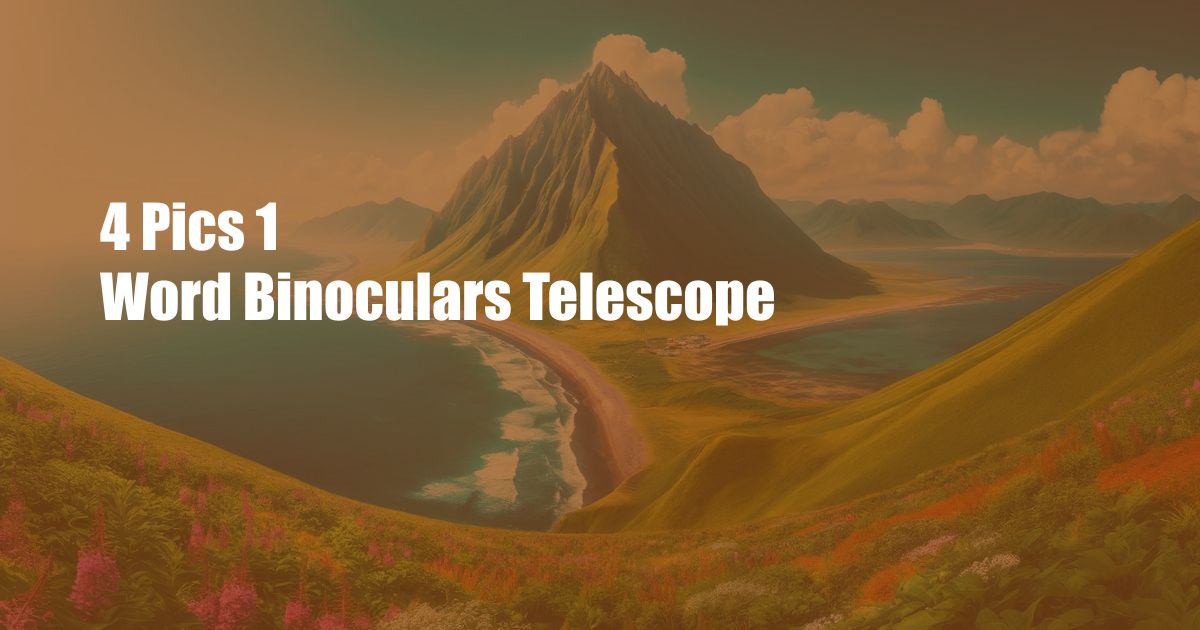
4 Pics 1 Word: Binoculars, Telescope – Unlocking the Secrets of the Universe
In the vast expanse of the cosmos, distant stars twinkle like celestial diamonds, beckoning us to explore the mysteries that lie beyond our immediate grasp. Binoculars and telescopes, our trusty companions in celestial adventures, empower us with the ability to pierce through the veil of darkness and unravel the secrets that have captivated humankind for centuries.
Whether you’re an avid birdwatcher, an aspiring astronomer, or simply curious about the wonders of the night sky, binoculars and telescopes offer a portal to a realm of infinite possibilities. With their ability to magnify distant objects, these optical marvels transform faint celestial objects into breathtaking spectacles, revealing the wonders that await us in the boundless expanse of the cosmos.
Binoculars: Your Gateway to Nature’s Hidden Realm
Binoculars, with their compact size and dual lenses, provide an accessible and versatile tool for exploring the world around us. They magnify distant objects, allowing us to observe wildlife up close, witness the grandeur of sporting events, or simply appreciate the intricate beauty of nature from a distance. Their portability makes them ideal for nature enthusiasts, hikers, and anyone who seeks to enhance their outdoor experiences.
When selecting binoculars, consider their magnification power, which determines how much an object is enlarged. Compact binoculars with magnifications of 8x or 10x are suitable for most general uses. For birding or wildlife viewing, binoculars with magnifications of 12x or 15x provide a closer look at distant subjects. Remember, higher magnification also reduces the field of view, so choose binoculars that balance magnification with a comfortable viewing experience.
Telescopes: Unveiling the Cosmic Tapestry
Telescopes, with their larger apertures and longer focal lengths, unlock a window to the heavens, enabling us to witness the breathtaking beauty of distant stars, galaxies, and nebulae. They gather and focus light from distant objects, allowing us to observe faint celestial bodies in remarkable detail.
Refractor telescopes, with their lens-based design, provide sharp images with minimal distortion. Reflectors, on the other hand, use mirrors to reflect light, offering larger apertures at a lower cost. The type of telescope you choose depends on your specific interests and budget. For beginners, refractor telescopes are generally easier to use and maintain.
The Evolution of Binoculars and Telescopes
The journey of binoculars and telescopes began centuries ago, with early prototypes emerging in the 16th century. Galileo Galilei’s pioneering work with telescopes revolutionized astronomy, leading to groundbreaking discoveries about the solar system and beyond. Over time, advancements in optical technology, lens design, and manufacturing techniques have significantly improved the performance and accessibility of these optical instruments.
Today, binoculars and telescopes come in a wide range of designs and sizes, catering to diverse needs and preferences. From compact and portable models to high-powered observatories, there’s a perfect optical instrument available for every adventurer and aspiring astronomer.
Tips for Using Binoculars and Telescopes
To maximize your experience with binoculars or telescopes, follow these expert tips:
- Stabilize your view: Use a tripod or monopod to steady your device, especially when using higher magnifications.
- Adjust the focus: Fine-tune the focus knobs until the image appears sharp and clear.
- Observe under clear skies: Avoid using binoculars or telescopes on cloudy or hazy nights for optimal visibility.
- Choose the right location: Step away from bright lights and light pollution for better observing conditions.
- Be patient: Allow your eyes to adjust to the darkness for enhanced night vision.
Remember, practice makes perfect. The more you use your binoculars or telescope, the more comfortable and skilled you’ll become in navigating the cosmos and capturing breathtaking celestial moments.
Frequently Asked Questions
- What is the difference between binoculars and telescopes?
Binoculars have two lenses and provide a wider field of view, while telescopes have a single lens and offer higher magnification. - How do I clean binoculars or telescopes?
Use a soft cloth or lens brush to gently remove dust and fingerprints. Avoid using harsh chemicals or abrasive materials. - What can I see with binoculars or telescopes?
Binoculars are ideal for wildlife viewing, nature observation, and sporting events. Telescopes allow us to observe stars, planets, galaxies, and other celestial wonders. - How powerful a telescope do I need?
The necessary magnification depends on your specific interests. For beginners, telescopes with magnifications of 50x to 150x are suitable for general celestial viewing.
Conclusion
Binoculars and telescopes, indispensable tools for exploration and discovery, empower us to witness the wonders of the natural world and the boundless expanse of the cosmos. Whether you’re an avid birdwatcher, an aspiring astronomer, or simply curious about the universe, these optical instruments provide a gateway to a realm of infinite fascination and knowledge.
Embrace the adventure and embark on your own celestial odyssey. With binoculars or telescopes in hand, let the universe unravel its secrets and ignite your passion for the wonders that lie beyond our immediate reach. Explore the hidden realm of nature, witness the birth and death of stars, and unravel the mysteries that have captivated humankind since the dawn of time.
Are you ready to embark on this extraordinary journey through the cosmos? Let the stars guide your path, and may your discoveries be as vast and awe-inspiring as the universe itself.

 Hogki.com Trusted Information and Education News Media
Hogki.com Trusted Information and Education News Media